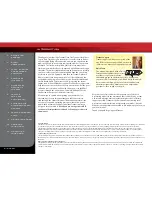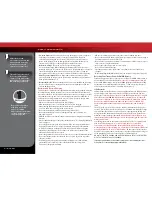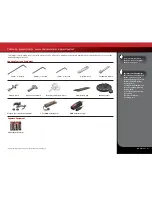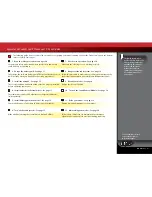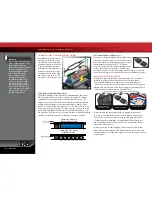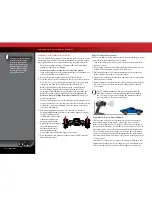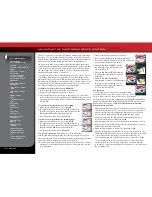
4 • SLASH
This model is not intended
for use by children under
14 years of age without the
supervision of a responsible
and knowledgeable adult.
All instructions and
precautions outlined in this
manual should be strictly
followed to ensure safe
operation of your model.
No previous experience
with radio controlled
models is required.
Models require a minimum
of setup, maintenance, or
support equipment.
•
Use Stock Connectors:
If you decide to change the battery or motor connectors,
only change one battery or motor connector at a time. This will prevent
accidentally mis-wiring the speed control. If the XL-5 is not wired exactly as
shown in the diagram, it can be damaged! Please note that modified speed
controls can be subject to a rewiring fee when returned for service.
•
No Reverse Voltage:
The speed control is not protected against
reverse polarity voltage. When changing the battery and/or motor, be sure to
install the same type of connectors to avoid reverse polarity damage to the speed
control. Removing the battery connectors on the speed control or using the
same-gender connectors on the speed control will void the product’s warranty.
•
Motor Capacitors Required:
Three 0.1µF (50V) ceramic capacitors should be
properly installed on every motor to prevent radio interference. Capacitors have
been provided with the XL-5.
•
No Schottky Diodes:
External schottky diodes are not compatible with reversing
speed controls. Using a schottky diode with the XL-5 will damage the ESC and
void the 30-day warranty.
Batteries and Battery Charging
The XL-5 speed control uses rechargeable batteries that must be handled with care
for safety and long battery life. Make sure to read and follow all instructions and
precautions that were provided with your battery packs and your charger. It is your
responsibility to charge and care for your battery packs properly. In addition to
your battery and charger instructions, here are some more tips to keep in mind.
• Never leave batteries to charge unattended.
• Remove the batteries from the model while charging.
• Allow the battery packs to cool off between runs (before charging).
• Always unplug the battery from the electronic speed control when the model is
not in use and when it is being stored or transported.
• Do not use battery packs that have been damaged in any way.
• Do not use battery packs that have damaged wiring, exposed wiring, or a
damaged connector.
• Children should have responsible adult supervision when charging and handling
batteries.
• Use the supplied charger to charge the included battery. See “Charging theBattery
Pack” on page 11.
• Do not charge batteries inside of an automobile. Do not charge batteries while
driving in an automobile. The charger is equipped with a long cord intended
to allow the battery to be charged outside of an automobile when using the
automobile’s auxiliary power socket. If the cord will not reach outside of the
automobile, find another power source.
• Never charge batteries on wood, cloth, carpet or on any other flammable material.
• Do not operate the charger in a cluttered space, or place objects on top of the
charger or battery.
• If a battery gets hot to the touch during the charging process (temperature
greater than 140°F / 60°C), disconnect the battery from the charger and
discontinue charging immediately.
• Always store battery packs safely out of the reach of children and pets.
• Do not short-circuit the battery pack. This may cause burns and severe damage to
the battery pack and create the risk of fire.
• Do not burn or puncture the batteries. Toxic materials could be released. If eye or
skin contact occurs, flush with water.
• Do not expose the charger to water or moisture.
• Do not disassemble the charger.
• Store the battery pack in a dry location, away from heat sources and direct
sunlight.
• Nickel-Metal Hydride (NiMH) batteries must be recycled or disposed of properly.
Recycling Your Traxxas Power Cell NiMH Battery
Traxxas strongly encourages you to recycle your Power Cell NiMH battery when it
has reached the end of its useful life.
Do not throw your battery in the trash.
All
Power Cell NiMH battery packs display the RBRC (Rechargeable Battery Recycling
Corporation) icon, indicating they are recyclable. To find a recycling center near
you, ask your local hobby dealer or visit www.call2recycle.org.
LiPo Batteries
Lithium Polymer (LiPo) batteries are becoming popular for use in R/C models due
to their compact size, high energy density, and high-current output; however,
these types of batteries require special care and handling procedures for long life
and safe operation.
WARNING: LiPo batteries are intended only for advanced
users that are educated on the risks associated with LiPo battery use. Traxxas
does not recommend that anyone under the age of 14 use or handle LiPo
battery packs without the supervision of a knowledgeable and responsible
adult.
The XL-5 speed control is able to use LiPo batteries with nominal voltage not to
exceed 7.4 volts (2S packs). LiPo batteries have a minimum safe discharge voltage
threshold that should not be exceeded. The XL-5 is equipped with built-in Low-
Voltage Detection that alerts the driver when LiPo batteries have reached their
minimum voltage (discharge) threshold.
It is the driver’s responsibility to stop
immediately to prevent the battery pack from being discharged below its safe
minimum threshold.
Low-Voltage Detection on the speed control is just one part of a comprehensive
plan for safe LiPo battery use.
It is critical for you, the user, to follow all
other instructions supplied by the battery manufacturer and the charger
manufacturer for proper charging, use, and storage of LiPo batteries. Make sure
you understand how to use your LiPo batteries.
Be aware that Traxxas shall not
be liable for any special, indirect, incidental, or consequential damages arising out
of the installation and/or use of LiPo batteries in Traxxas products.
DO NOT ATTEMPT TO CHARGE LIPO BATTERIES OR ANY OTHER TYPE OF BATTERY
WITH THE INCLUDED TRAXXAS CHARGER.
If you have questions about LiPo battery usage, please consult with your local
hobby dealer or contact the battery manufacturer.
SAFETY PRECAUTIONS


